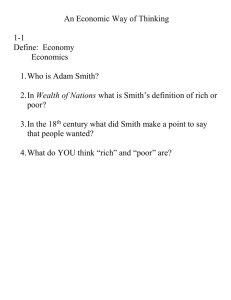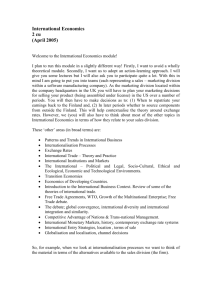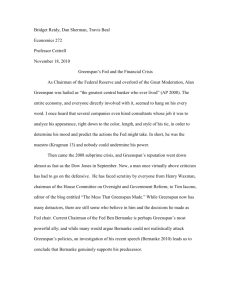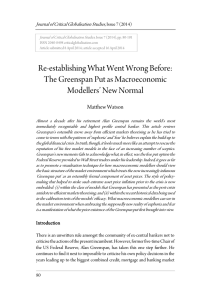Handout
advertisement
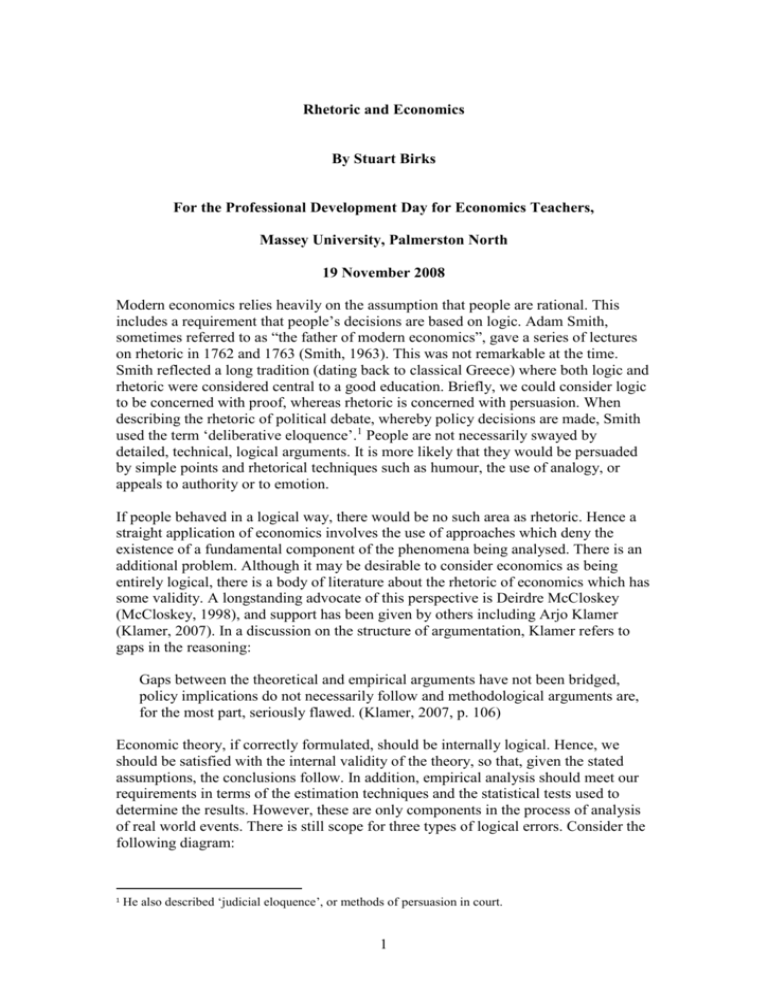
Rhetoric and Economics By Stuart Birks For the Professional Development Day for Economics Teachers, Massey University, Palmerston North 19 November 2008 Modern economics relies heavily on the assumption that people are rational. This includes a requirement that people’s decisions are based on logic. Adam Smith, sometimes referred to as “the father of modern economics”, gave a series of lectures on rhetoric in 1762 and 1763 (Smith, 1963). This was not remarkable at the time. Smith reflected a long tradition (dating back to classical Greece) where both logic and rhetoric were considered central to a good education. Briefly, we could consider logic to be concerned with proof, whereas rhetoric is concerned with persuasion. When describing the rhetoric of political debate, whereby policy decisions are made, Smith used the term ‘deliberative eloquence’.1 People are not necessarily swayed by detailed, technical, logical arguments. It is more likely that they would be persuaded by simple points and rhetorical techniques such as humour, the use of analogy, or appeals to authority or to emotion. If people behaved in a logical way, there would be no such area as rhetoric. Hence a straight application of economics involves the use of approaches which deny the existence of a fundamental component of the phenomena being analysed. There is an additional problem. Although it may be desirable to consider economics as being entirely logical, there is a body of literature about the rhetoric of economics which has some validity. A longstanding advocate of this perspective is Deirdre McCloskey (McCloskey, 1998), and support has been given by others including Arjo Klamer (Klamer, 2007). In a discussion on the structure of argumentation, Klamer refers to gaps in the reasoning: Gaps between the theoretical and empirical arguments have not been bridged, policy implications do not necessarily follow and methodological arguments are, for the most part, seriously flawed. (Klamer, 2007, p. 106) Economic theory, if correctly formulated, should be internally logical. Hence, we should be satisfied with the internal validity of the theory, so that, given the stated assumptions, the conclusions follow. In addition, empirical analysis should meet our requirements in terms of the estimation techniques and the statistical tests used to determine the results. However, these are only components in the process of analysis of real world events. There is still scope for three types of logical errors. Consider the following diagram: 1 He also described ‘judicial eloquence’, or methods of persuasion in court. 1 Theory B Empirical analysis A C Real world A type-A error arises when theoretical results are assumed to be directly applicable to the real world. A type-B error can arise due to data problems, or difficulties specifying and estimating relationships and functional forms that match the theory. A type-C error occurs when incorrect conclusions are drawn from statistical results, either through a misinterpretation of the meaning of the results, or a failure to consider additional, relevant policy dimensions. Such possible errors occur repeatedly. Type-A errors are particularly topical at the present time, so here are two illustrations. The information prepared for the public on Paul Krugman’s award of the Prize in Economic Sciences states that the model he developed shows that foreign trade between identical countries “will arise”, intra-industry trade “will occur”, and consumers “will benefit” (The Royal Swedish Academy of Sciences, 2008). Models can show what will happen within the model, or what will happen if the world behaves “as if” in the model, but they do not show what will happen in the real world. On 23 October in the US, the former chairman of the Federal Reserve, Alan Greenspan, appeared before the House Oversight and Government Affairs Committee, where he read a statement (Greenspan, 2008) and answered questions. Here is an extract from an exchange between him and the chairman of the committee, Rep. Henry Waxman: WAXMAN: The question I have for you is, you had an ideology. You had a belief that free competitive [sic] and this is your statement, 'I do have an ideology that free, competitive markets are by far the unrivalled way to organize economies. We tried regulation. None meaningfully worked.' That was your quote. You had the authority to prevent irresponsible lending practices that led to the subprime mortgage crisis. You were advised to do so by many others. And now the whole economy is paying the price. Do you feel that your ideology pushed you to make decisions that you wish you had not made? 2 GREENSPAN: Well remember that what an ideology is is a conceptual framework with the way people deal with reality. Everyone has one. To exist, you need an ideology. The question is whether it is accurate or not. And what I'm saying to you is yes, I've found a flaw, I don't know how significant or permanent it is, but I've been very distressed by that fact... WAXMAN: You found a flaw in the reality... GREENSPAN: Flaw in the model that I perceived as the critical functioning structure that defines how the world works. WAXMAN: In other words, you found that your view of the world, your ideology was not right. GREENSPAN: Precisely. (James, 2008) Greenspan was treating his chosen theoretical perspective as if it were representative of the real world. There was a rhetorical leap, and a leap of faith at that, given that he considered it his ideology. This is a cautionary tale. Economists have been warned against such errors. Sir Roy Harrod, 70 years ago, said, “[E]conomists, even the most theoretical, have been prone to give advice on the basis of theory” (Harrod, 1938, p. 387). However, when they do this: They must say good-bye for ever to the claims to certainty which they could make so long as they remained within the confines of their geometrical system. From being one of the most exact, albeit narrowly circumscribed, sciences, economics of necessity becomes one of the most conjectural. (Harrod, 1938, p. 388) Greenspan, A. (2008). Testimony to the Committee of Government Oversight and Reform, October 23. Retrieved 24 October 2008, from http://oversight.house.gov/documents/20081023100438.pdf Harrod, R. F. (1938). Scope and Method of Economics. The Economic Journal, 48(191), 383-412. James, F. (2008, 23 October). Greenspan: Money mess rocked his world. Retrieved 24 October 2008, from http://www.swamppolitics.com/news/politics/blog/2008/10/greenspan_money _mess_rocked_hi.html Klamer, A. (2007). Speaking of economics: how to get in the conversation. New York: Routledge. McCloskey, D. N. (1998). The rhetoric of economics (2nd ed.). Madison, Wis.: University of Wisconsin Press. Smith, A. (1963). Lectures on rhetoric and belles lettres: delivered in the University of Glasgow by Adam Smith, reported by a student in 1762-63. London: Nelson. The Royal Swedish Academy of Sciences. (2008). The Prize in Economic Sciences 2008: Information for the public [Electronic Version]. Retrieved 10 November 2008 from http://nobelprize.org/nobel_prizes/economics/laureates/2008/info.pdf 3 4


